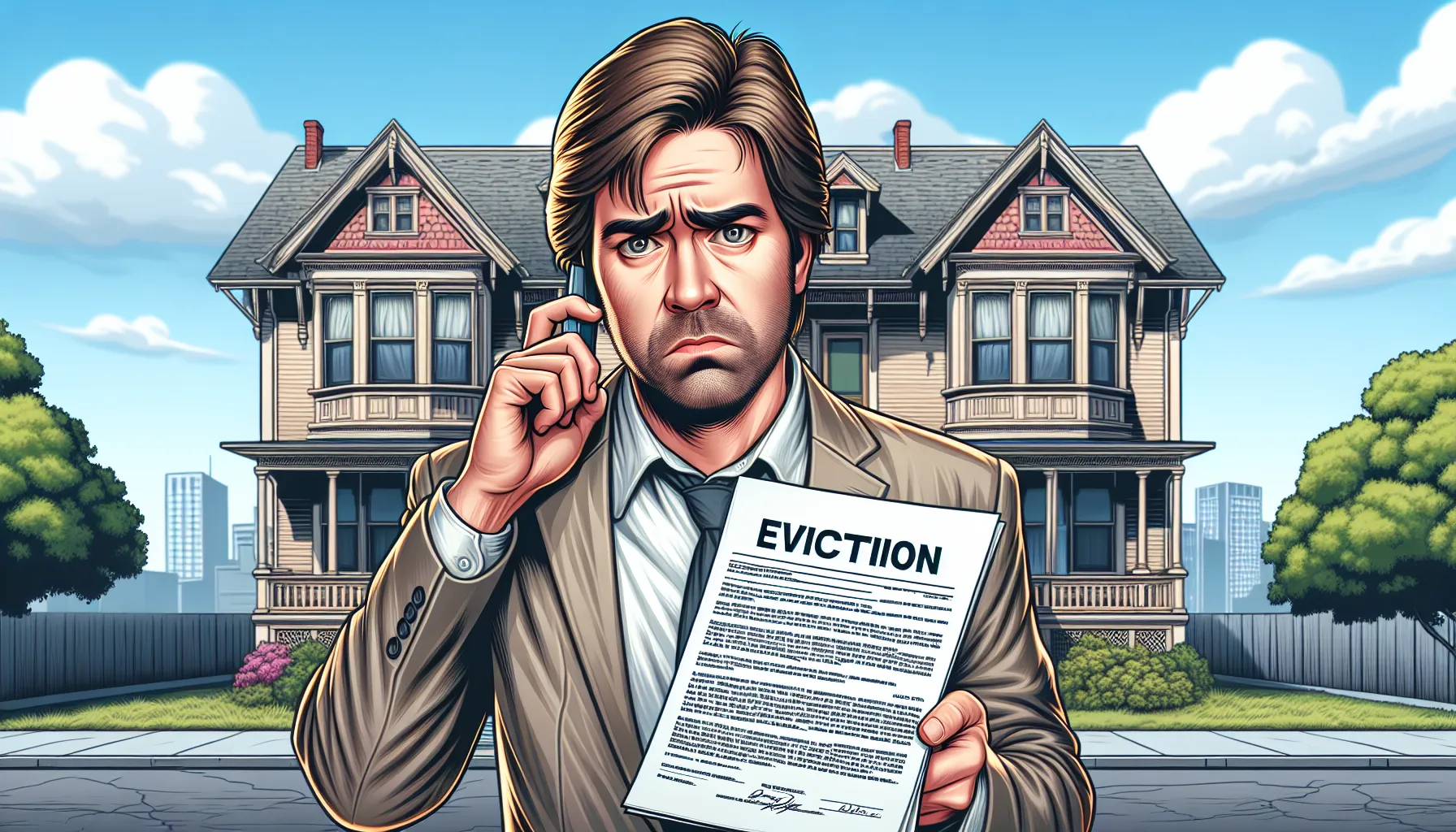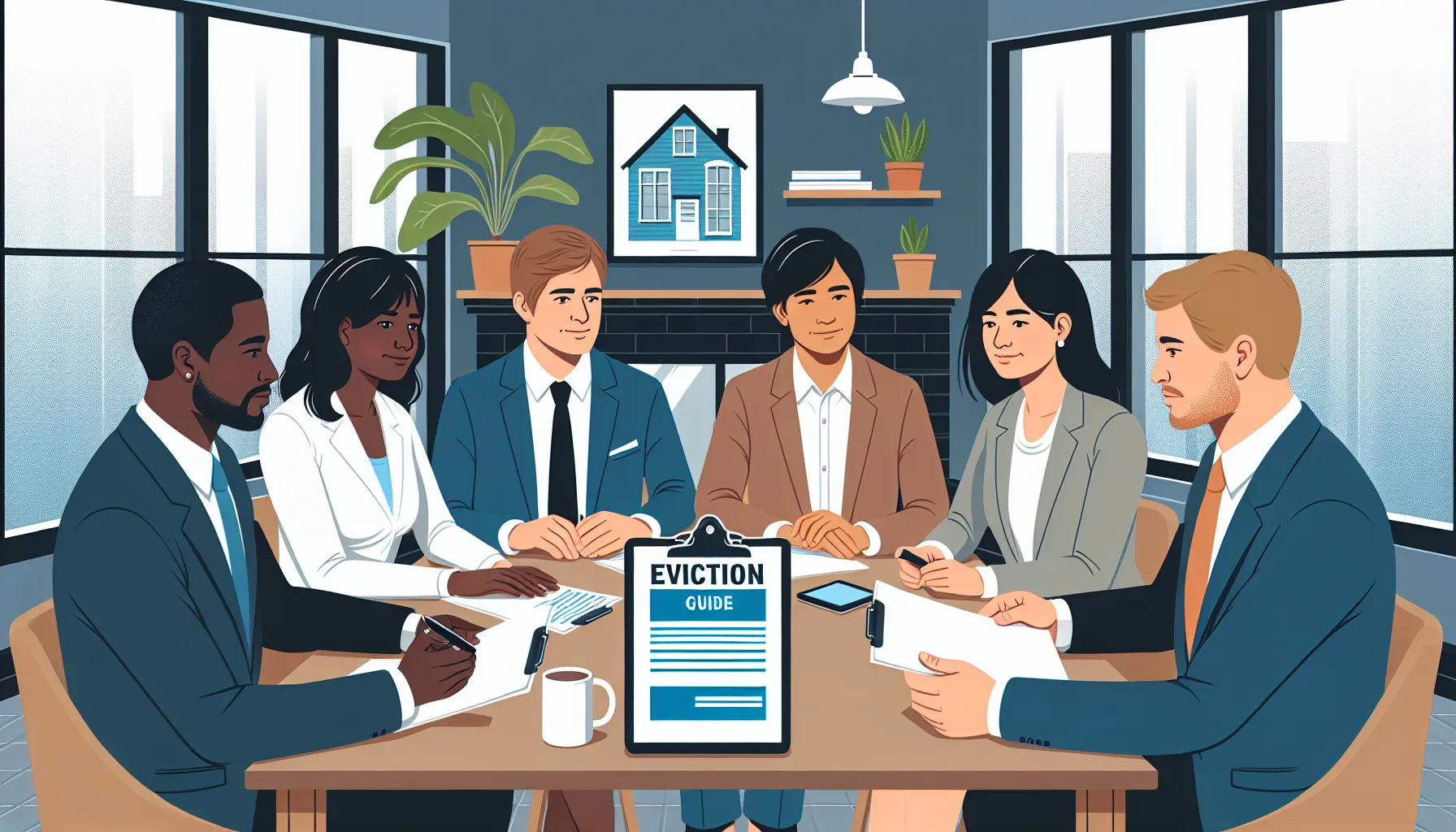Key Takeaways
- Understand and comply with Concord’s specific eviction laws, including notice requirements, timelines, and tenant rights, to avoid legal complications.
- Proper documentation, such as accurate notices, lease agreements, and payment records, is essential for a smooth and compliant eviction process.
- Regularly update your knowledge of Concord’s eviction regulations, as laws can evolve and impact your compliance efforts.
- Respect tenant rights and maintain clear, professional communication to build stronger landlord-tenant relationships and reduce potential disputes.
- Using the Concord Eviction Compliance Guide streamlines eviction processes, minimizes legal risks, and ensures both fairness and accuracy.
Eviction laws can feel overwhelming, especially when you’re trying to protect your property while following local regulations. If you’re a landlord in Concord, understanding compliance requirements is essential to avoid legal complications and maintain a positive relationship with your tenants. But where do you start, and how can you be sure you’re handling everything correctly?
I know how challenging it can be to navigate these situations. Questions about notice periods, valid reasons for eviction, and proper documentation can leave anyone feeling uncertain. By breaking down the key steps and legal expectations, this guide aims to help you approach the process with clarity and confidence. Are you ready to simplify what might seem like a complicated process? Let’s get started.
Understanding The Concord Eviction Compliance Guide
Eviction compliance in Concord requires careful attention to local laws and procedures. Each step in the process has specific requirements, from providing proper notice to filing the necessary documentation. Missing even a small detail can cause delays or legal complications.
Clear communication is essential in eviction cases. The guide helps landlords recognize valid reasons for eviction, like unpaid rent or lease violations, and explains how to document these properly. Are you confident that your notices and documentation meet Concord’s legal standards? This is a crucial question every landlord should address.
Timelines play a significant role in compliance. Notices must adhere to specific timeframes, which vary depending on the circumstances. For example, a tenant failing to pay rent may require a different notice period than a tenant violating other lease terms.
Understanding tenant rights is equally important. Concord’s regulations protect tenants against unlawful evictions. Following the legal process supports good tenant relationships and demonstrates fairness. How familiar are you with Concord’s tenant protections? Addressing this can prevent misunderstandings or legal disputes.
Compliance requires staying updated on any changes to local regulations. Laws often evolve, making it necessary for landlords to review their practices regularly. Are there areas where you might need to deepen your knowledge or adjust your processes to align with current requirements? Identifying these can strengthen your approach to property management.
Key Legal Requirements For Evictions

Evictions in Concord demand adherence to specific legal requirements. Understanding these steps can help landlords avoid disputes and maintain compliance.
Notices And Timelines
Providing the correct eviction notice is critical. Notices must clearly state the reason for eviction, such as unpaid rent or lease violations, and comply with Concord’s laws. For nonpayment of rent, landlords commonly issue a 3-Day Notice to Pay Rent or Quit, giving tenants three days to settle the balance. For lease violations, a 10-Day Cure or Quit Notice may apply, depending on the situation.
Timelines for these notices vary based on the reason, so reviewing local regulations is essential before proceeding. Are you sure the notice you’re using complies with the current requirements? Keeping thorough records of when notices are served is also a good practice.
Tenant Rights And Protections
Tenants in Concord are afforded significant protections by local and state laws. These include rights to habitability, fair treatment, and protection against retaliation. Unlawful evictions, such as removing tenants without proper notice or legal cause, could result in penalties for landlords.
What steps are you taking to respect these rights during the eviction process? Ensuring tenants’ rights are upheld fosters mutual respect and reduces potential conflicts.
Landlord Obligations
Landlords must meet several obligations when pursuing evictions. Filing accurate court documents, delivering notices properly, and attending hearings, if required, are all part of the process. Maintaining detailed records of rent payments, lease agreements, and communication with tenants is highly beneficial.
Do you have robust systems in place to manage these duties? Remaining organized and informed about Concord’s eviction procedures not only supports compliance but also contributes to effective property management.
Common Challenges With Eviction Compliance

Eviction compliance in Concord presents several challenges that landlords often encounter during the process. Addressing these difficulties is key to avoiding delays or potential legal setbacks. Do these issues sound familiar to you?
Avoiding Errors In Documentation
Accurate documentation is essential during an eviction. Errors in notices, dates, or tenant details can invalidate the process and restart timelines. For example, serving a 3-Day Notice to Pay Rent or Quit without reflecting accurate amounts due leaves room for tenant disputes. Maintaining detailed records of rent payments, lease agreements, and tenant communication minimizes errors. Do you routinely cross-check documents to confirm their accuracy?
Staying updated with changes in local eviction requirements is crucial. New adjustments to notice formats or procedural rules might not always align with prior practices. Review templates regularly and update them to match current compliance expectations. How often do you revisit your legal forms to keep them current?
Handling Tenant Disputes
Tenant disputes commonly arise during evictions. Allegations of improper notice, unaddressed repair requests, or unclear lease terms can complicate proceedings. Proactively addressing tenant concerns before initiating eviction reduces risks of conflict. For instance, reviewing maintenance requests or lease violations and resolving them preemptively builds a stronger case. How do you approach tenant concerns before escalating issues?
Clear communication plays a significant role in managing disputes. Documenting conversations and providing written responses to tenant complaints creates transparency. If a tenant refuses to vacate despite receiving proper notice, be prepared to present evidence in court that demonstrates procedural compliance. Would documenting every interaction make your case stronger if challenged?
Being prepared for tenant pushback requires patience and a comprehensive understanding of local laws. Research Concord-specific tenant protections and remain professional throughout disagreements to support a fair and lawful resolution.
Steps To Ensure Proper Eviction Compliance

Compliance with eviction laws is crucial to protect landlord rights and maintain tenant fairness. Taking the right steps decreases risks and simplifies the process.
Preparing Necessary Documents
Proper documentation is critical during an eviction. I create and organize all necessary paperwork before initiating the process. This includes the lease agreement, proof of tenant violations, and a ledger of rent payments. If there are communications with the tenant regarding warnings or unpaid rent, I always keep copies. Having these files readily available strengthens my case if disputes arise. Are your records organized to support your claims?
Maintaining detailed records also avoids potential errors. For example, if I serve the wrong notice or provide incomplete information, it might delay the eviction or lead to dismissal. Accurate paperwork helps prevent costly mistakes.
Following Local Laws And Regulations
Eviction rules vary by region, making it vital to understand Concord’s specific laws. I familiarize myself with required notice periods, valid eviction reasons, and tenant rights. For instance, I know that a 3-Day Notice to Pay Rent or Quit applies to unpaid rent, while a 10-Day Cure or Quit Notice typically addresses lease violations.
Improper adherence to legal steps can invalidate an eviction. I always reference up-to-date Concord regulations to avoid violating tenant protections or facing penalties. Did you know that even small procedural errors might restart the eviction timeline?
Remaining considerate and respectful when dealing with tenants also supports lawful practices. For every action I take, I consider the legal and ethical implications, ensuring the process respects both parties. Compliance isn’t just about following the law; it’s about maintaining fairness in my property management practices.
Benefits Of Using The Concord Eviction Compliance Guide

Staying compliant with Concord’s eviction laws is essential for landlords. The Concord Eviction Compliance Guide provides valuable support in managing those responsibilities effectively.
Streamlined Eviction Processes
The guide simplifies the steps involved in handling evictions within Concord. It breaks down essential actions like delivering the correct notice type, adhering to proper timelines, and preparing accurate documentation. Are you confident that you’re using valid procedures for notices like the 3-Day Notice to Pay Rent or Quit? By following the guide, landlords avoid common errors that delay cases and extend conflicts. Its structured approach means less confusion and faster resolutions.
Reduced Legal Risks
Non-compliance with local eviction laws can lead to severe consequences. The guide helps landlords understand their obligations, protect tenant rights, and avoid mistakes that may lead to fines or lawsuits. Have you considered how clear records and legal documents safeguard both you and your tenants? Using the guide’s resources reduces the chances of disputes escalating into costly legal challenges. This focus on accuracy and fairness builds stronger landlord-tenant relationships while maintaining proper legal standing.
Conclusion
Navigating eviction compliance in Concord requires a solid understanding of local laws and a commitment to fair practices. By staying informed and organized, landlords can avoid unnecessary complications while fostering respectful tenant relationships.
The Concord Eviction Compliance Guide offers invaluable support, helping landlords streamline the process, reduce legal risks, and handle challenges effectively. With the right tools and knowledge, managing evictions becomes less daunting and more efficient.
Frequently Asked Questions
What are valid reasons for evicting a tenant in Concord?
Landlords can evict tenants for valid reasons, such as unpaid rent, lease violations, or illegal activities on the property. It’s essential to ensure the reason is legally recognized under Concord’s eviction laws to avoid disputes or legal complications.
What types of eviction notices are commonly used in Concord?
In Concord, landlords typically issue a 3-Day Notice to Pay Rent or Quit for nonpayment of rent and a 10-Day Cure or Quit Notice for lease violations. These notices must comply with local legal requirements to be valid.
How important is documentation during the eviction process?
Proper documentation is critical as it ensures compliance with eviction laws and protects landlords in case of legal disputes. Key documents include rent payment records, communication logs, and copies of eviction notices.
How long are the notice periods for eviction in Concord?
Notice periods vary based on the reason for eviction. For example, a 3-day notice applies to unpaid rent, while other violations may require a 10-day notice. Understanding these timelines is crucial for compliance.
Can landlords evict tenants without following legal procedures?
No, landlords must follow Concord’s eviction laws and comply with proper procedures. Unlawful evictions can result in penalties, lawsuits, or delays in the process.
How can landlords stay updated on Concord’s eviction regulations?
Landlords can stay informed by regularly reviewing local housing laws, attending landlord workshops, or consulting legal professionals. Using resources like the Concord Eviction Compliance Guide also helps ensure current compliance.
What should landlords know about tenant rights in Concord?
Tenants in Concord are entitled to protections, such as the right to habitability and fair treatment. Landlords must respect these rights and follow proper legal steps to avoid disputes or legal repercussions.
What common mistakes should landlords avoid during evictions?
Landlords should avoid errors like using incorrect notice forms, failing to provide sufficient notice periods, or neglecting proper documentation. Such mistakes can delay the process or lead to legal challenges.
How does clear communication help during the eviction process?
Clear communication fosters transparency, helping resolve conflicts and reducing misunderstandings. Properly documenting conversations with tenants also supports legal compliance and strengthens landlord-tenant relationships.
What are the benefits of using the Concord Eviction Compliance Guide?
The Concord Eviction Compliance Guide simplifies the eviction process by breaking down essential steps, such as proper notice delivery and accurate documentation. It helps landlords avoid errors, reduce legal risks, and manage evictions effectively.
